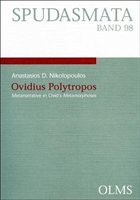Die Erzählstimme von Ovids Metamorphosen durchläuft vielfache Veränderungen. 'Ovidius Polytropos' ist eine systematische Untersuchung dieser Transformationen und der daraus resultierenden Metaerzählungen, welche die Dichtung zu einer Enzyklopädie narrativer Formen und Kontexte vom Olymp bis nach Italien und von Homers Odyssee und Lucilius' Satiren bis hin zu Vergils Aeneis werden lassen. Basierend auf dem narratologischen Modell, das von Gérard Genette entwickelt wurde, stellt der Autor originelle Diskussionen der von der Erzähltheorie aufgeworfenen theoretischen Fragen vor, insbesondere im Hinblick auf ihre feministischen und soziologischen Perspektiven .
The narrative voice of Ovid's Metamorphoses undergoes multiple changes. 'Ovidius Polytropos' is a systematic study of these transformations and the resulting metanarratives, which render the poem an encyclopedia of narrative forms and contexts from Olympus to Italy, and from Homer's Odyssey and Lucilius' satires to Vergil's Aeneid. Founded on the firm basis of the narratological model developed by Gérard Genette, the author introduces original discussions of the theoretical questions raised by narrative theory, in particular the issue of its feminist and sociological perspectives.
The narrative voice of Ovid's Metamorphoses undergoes multiple changes. 'Ovidius Polytropos' is a systematic study of these transformations and the resulting metanarratives, which render the poem an encyclopedia of narrative forms and contexts from Olympus to Italy, and from Homer's Odyssey and Lucilius' satires to Vergil's Aeneid. Founded on the firm basis of the narratological model developed by Gérard Genette, the author introduces original discussions of the theoretical questions raised by narrative theory, in particular the issue of its feminist and sociological perspectives.

